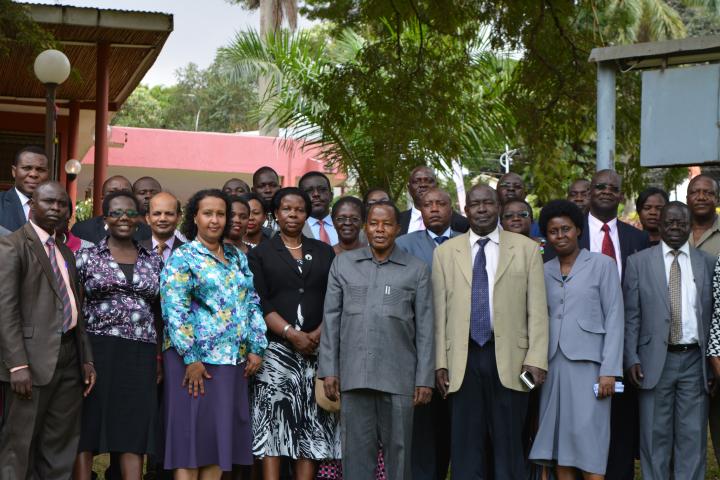
KAMPALA – In Uganda, 56 percent women and girls between the age of 15-49 experience spousal violence while 22% are subjected to sexual violence, according to the Uganda Demographic Household Survey 2016.
While the existence of gender-based violence violates the human rights of women and children and slows down progress in achieving sustainable inclusive human development, it has persisted in Uganda due to social beliefs, perceptions and attitudes about societal roles of women and men, boys and girls.
To reverse this trend, the United Nations system in Uganda, with funding from the European Union (EU), is supporting the Government of Uganda to implement the four-year $42.4 million Spotlight Initiative aimed at eliminating violence against women and girls by 2030.
On Friday (June 7, 2019) representatives of the UN system in Uganda led by the Resident Coordinator, Ms. Rosa Malango, the Deputy Head of the European Union Delegation, Ms. Anna Merrifield and the Minister of Gender Labour and Social Development, Hon. Janat Mukwaya signed the country programme document for the EU-UN Spotlight Initiative.
Ms. Malango noted that Gender-Based Violence (GBV) is a violation of human rights for women and girls and a threat to the achievement of sustainable development that leaves no one behind.
“The goal of the Spotlight Initiative is for all women and girls, particularly those most vulnerable, to live a life free of violence and harmful practices,” Ms. Malango said. “This initiative will give prominence to prevention, protection, and the provision of services, alongside broader efforts to ensure women’s economic empowerment,” she explained.
In Africa, the programme will benefit only 8 out of the 56 nations on the continent and in the East African region, Uganda is the only beneficiary. It will be implemented nationally, as well as in seven districts; Amudat, Arua, Kampala, Kasese, Kitgum, Kyegegwa, and Tororo where gender-based violence has been reported to be prevalent.
Gender Minister, Hon. Mukwaya pledged the commitment of her ministry to support the programme and to push through related policies. The minister said that the National Policy on Elimination of GBV promotes multi-sectoral collaboration among actors to ensure effective and efficient service delivery to survivors and victims, including legal redress, health care and psychological support.
“The government of Uganda is committed to ending violence against women and girls by addressing the root causes of gender-based violence, poverty and gender inequalities, which undermine our goal to achieve the social-economic transformation of the population,” Hon. Mukwaya said. “The EU-UN Spotlight Initiative is therefore timely in complementing on-going initiatives for addressing gender-based violence in the country,” she added.
On behalf of the EU Delegation in Uganda, Ms. Merrifield pointed out that the Spotlight Initiative is a confirmation that gender equality and women empowerment remains a top priority for both the European Union and the United Nations.
“The Spotlight Initiative provides a unique opportunity to demonstrate that concerted and comprehensive investments in gender equality can make a difference in the lives of women and girls as we contribute to the achievement of SDGs,” Ms. Merrifield observed.
SDG 5 targets to end all forms of discrimination against all women and girls everywhere and elimination of all harmful practices, such as child, early and forced marriage and female genital mutilation.
According to Ms. Merrifield sexual and gender-based violence is one of the most widespread, persistent and devastating human rights violation, occurring worldwide and cutting across generations, nationalities and communities. “It happens everywhere, every day and it affects everyone – entire societies, and not only women.”
About Spotlight Initiative:
The Initiative is a global, multi-year partnership between the European Union and the United Nations to eliminate all forms of violence against women and girls by 2030.
The Uganda Spotlight Initiatives seeks to capitalize on existing government programmes and interventions, as well as pilot new innovations and scale-up evidence-based models.
Collaborative partnerships with government, civil society, religious and cultural institutions, the women’s movement, donors, and the private sector will be critical throughout the programme implementation.
The Spotlight Initiative implementation shall be coordinated through the United Nations Resident Coordinator’s Office and implemented through five core United Nations agencies; UN Women, UNDP, UNFPA, UNHCR and UNICEF, and three associated agencies; IOM, OHCHR, and Pulse Lab.





